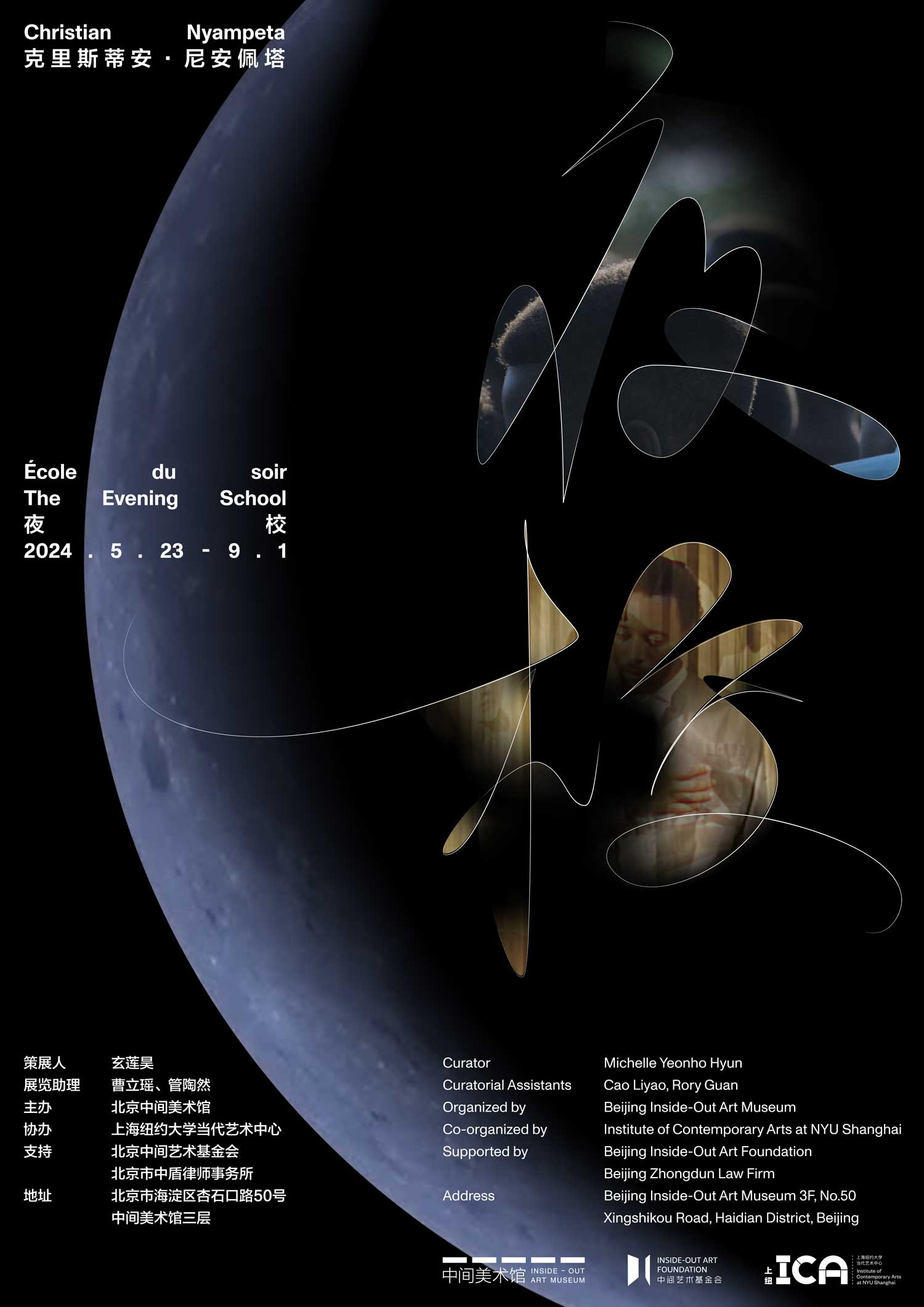展期 Period:
2024.5.23—2024.9.1
艺术家 Artist:
克里斯蒂安·尼安佩塔 Christian Nyampeta策展人 Curator:
主办 Host:
协办 Co-host:
上海纽约大学当代艺术中心 Institute of Contemporary Arts at NYU Shanghai
地点 Venue:
前言 Introduction:
中间美术馆荣幸呈现艺术家克里斯蒂安·尼安佩塔(Christian Nyampeta)的艺术项目“夜校”(École du soir),这是继上海纽约大学当代艺术中心(上纽ICA)之后,“夜校”在中国展出的第二站,由上海纽约大学当代艺术中心馆长玄莲昊(Michelle Yeonho Hyun)策划。
“夜校”由艺术家克里斯蒂安·尼安佩塔召集,是一个持续多年的艺术项目。“夜校”植根于对非洲具体经验的研究与反思,以展览、翻译、出版、放映和讨论等形式,为情感、思想与行动创造空间,探索在差异主导的时代建立共同生活的可能。借由多位艺术家同道、机构和网络的支持,“夜校”形成了一个集体学习的环境。观众可以在艺术家设计的家具上观看、阅读、思考与交流,这些家具是以他童年在卢旺达的学校环境为蓝本设计的;它们形成一个形式多变的开放结构,可容纳集体感知、共同思考与互动。
“夜校”既是实体的也是概念的空间,既是思维方式也是行动方法。其灵感来自塞内加尔作家兼电影导演乌斯曼·塞姆班(Sembène Ousmane),他将电影视为“夜间课程”(cours du soir)。在他看来,电影是民众接收信息的渠道,兼具教育、美学体验以及大众传播的功能。他的工作方法同时汲取了台上(本土)的集体创作和台下(全球)的视角——创作者与观看者总是处于不同的时间、历史和社会处境中,以不同的方式看待和处理影像所传达的信息——形成了本土性与世界性的交互。塞姆班所强调的不只是电影作为通俗知识的教育属性,更重要的是其在生产与传播非洲主体性知识中所具有的潜力。
在“夜校”项目中,尼安佩塔持续以不同类型的实践探索知识分享的公共方式。通过他组织的诸多翻译与出版项目,有关非洲的知识以思想接力的方式被译介到了不同文化之中。本次展览将呈现此前在世界各地其它地方组织的“夜校”项目中所积累的播放列表、出版物与绘画作品。
“夜校”的一部分是放映活动——在这里不同面孔的人物在荧幕上出现,不同面孔的观众在台下观看,台上与台下,跨越了时空,在虚拟的交汇里讨论着社会变化、文化财产,以及究竟谁才有代表的权利,谁才有赋予意义的权利?另一部分是“文本工作间”——由艺术家、行动者与知识分子组成工作小组,一起翻译哲学家苏莱曼尼·贝希尔·迪亚涅(Souleyman Bachir Diagne)的文本。迪亚涅认为“思考非洲”就是用一种语言去思考另一种语言。同时,“夜校”囊括了一系列兼具功能性和雕塑性的结构原型,使展厅成为一个接待空间,许多活动即将在这里发生,比如影像放映、声音聆听、工作坊、排练、对话和接触即兴。
“夜校”向此时此地的我们提出了这样的一个问题:为何要思考非洲?展览本身即是对于这个问题的回答。围绕着“思考非洲”这一线索,这一空间中将不断涌现出丰富的集体感受、共同思考和互助行动。这些极具智识层面去殖民化意识的思想片段,将我们直接推至人类境况的核心。在这一意义上,我们将共同反思作为普遍性的知识,并朝向人类的共通性迈进。这也是“夜校”所关注的另一个迫在眉睫的全球性问题:我们如何共同生活?
届时欢迎大家在此观影,或者参加工作坊和文本工作间的活动,当然也可以根据个人或集体的需要使用这个空间。在这个知识和思想的庇护所中,艺术家邀请参与者重思差异作为连接彼此的可能性,直面这些知识档案所揭示的我们各自认知的局限,进一步探索关联我们彼此的思想路径。“夜校”在上海纽约大学当代艺术中心编织出珍贵的文化交流时刻:连结起不同的生活圈,创造有意义的相遇,形成共同实践的社群。北京中间美术馆长期致力于支持和展现严肃的、实验性的当代艺术与思想实践,我们也期待在北京呈现“夜校”,可以把这些译介而来的内容传递给所有愿意学习非洲知识的同行者们,搭建起对话的桥梁,制造意料之外的相遇,并勾连起发生在过去和当下的关于如何共同生活与共同思考的挑战。
Inside-Out Art Museum is pleased to present École du soir, a project convened by artist Christian Nyampeta. Following its manifestation at Institute of Contemporary Arts (ICA) at NYU Shanghai, curated by ICA director/curator Michelle Yeonho Hyun, this is the second time that the project is realized in China.
Convened by artist Christian Nyampeta and supported by fellow artists, institutions and networks, École du soir (The Evening School) is a multiform hosting structure for collective feelings, cooperative thinking, and mutual actions. An ongoing project of the artist for over a decade, École du soir is rooted in research and reflections on specific experiences in Africa, creating space for emotions, thoughts and actions in the form of exhibitions, translations, publications, screenings and discussions, exploring the possibilities of building a common life in an era dominated by differences. École du soir serves as a space for collective learning, in which audiences are welcomed to watch, read, reflect and interact with the hosting structure designed by the artist, which is based on the school environment of his childhood in Rwanda.
École du soir is both a physical and a conceptual space, a way of thinking and simultaneously a way of acting. As an evening school, it draws from writer and filmmaker Sembène Ousmane’s idea of cinema as “cours du soir” or “evening classes.” Sembène viewed cinema as a popular information system in the service of education, aesthetic experience, and public dissemination. His methodology and investing in its viewing methods drew from different uses of time, visual and textual histories, social struggles and hopes, in mutuality between his own locality and the world at large. What Sembène stressed is not just the educational role that cinema plays in popular knowledge, but more importantly its potential in the production and dissemination of knowledge of African subjectivity.
In École du soir, Nyampeta continues to explore public ways of sharing knowledge through different types of practices. Through the many translation and publication projects he has organised, knowledge about Africa has been translated into different cultures in a relay of ideas. This exhibition will present playlists, publications and drawings gathered from previous École du soir projects organised in other locations around the world.
Part of the École du soir is screening, a cinema screens films that gather unlikely figures, across times and spaces, in fictional encounters to discuss social transformation, cultural property, and who has the right to representation and meaning. The other part is a “scriptorium”, which assembles a working group of artists, activists, and scholars to translate texts by philosopher Souleyman Bachir Diagne, who proposed that “thinking Africa” is to think from language to language. At the same time, École du soir encompasses a series of functional and sculptural structural prototypes that turn the museum space into a hosting structure where many activities are to take place, such as video screenings, listening sessions, workshops, rehearsals, dialogues and contact improvisation.
École du soir poses the question to us here and now: why thinking Africa? The exhibition itself is an answer to this question. Around the thread of “Thinking Africa,” this space will be a constant source for rich collective feelings, shared reflections and mutually supportive actions. These intellectually decolonizing fragments of thought take us right to the heart of the human condition. In this sense, we will reflect together on knowledge as a (planetary) commons. And this is another urgent question that École du soir wishes to address, that is planetary in scope: how do we live together?
We invite you to watch films, participate in workshops and “scriptorium” activities, and to use the space according to your needs, individually or collectively. In this sanctuary of knowledge and ideas, the artist invites participants to reconsider their differences as points of unity/being in common, face the limits of our individual perceptions as revealed by these archives of knowledge, and further explore the paths of thought that connect us to one another. École du soir weaves together an invaluable moment of cultural exchange: to connect life worlds, to host meaningful encounters, and to form communities of practice. Beijing Inside-Out Art Museum is continuously committed to supporting and presenting serious, experimental contemporary art and intellectual practices. We are delighted to present École du soir in Beijing, where the translated content can be passed on to all our peers who are willing to learn with African intellectual and artistic legacies. As such, we hope to build bridges of dialogue, create unexpected encounters, and to conjure up the challenges of how to live together and think together from in the past and in the present.

